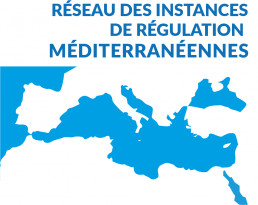The 10th Plenary Assembly of the Mediterranean Network of Regulatory Authorities was held at Reggio Calabria on the invitation of the Autorità per le Garanzie nelle Comunicazioni (AGCOM) of Italy, on 2 and 3 October 2008, under the presidency of Mr Ahmed Ghazali, president of the Haute Autorité de la communication audiovisuelle (HACA) of Morocco.
From a total of eighteen regulatory authorities members of the Network, sixteen were present at the meeting. The two Israeli Authorities, i.e. the Council for Cable TV and Satellite Broadcasting and the Second Authority for Television and Radio could not be present at this meeting.
At the meeting in Reggio, members of the Network also discussed the participation of countries and organisations under the status of observers, some of which to join the Network or under the status of authorities associated to the Network and its members through programmes or the projects of cooperation and partnership.
The representatives of the Radio and Television Union of Egypt, the Conseil National de l’Audiovisuel of Lebanon, the Conseil Supérieur de la Communication of Tunisia, as well as persons representing the European Commission, the European Platform of Regulatory Authorities (EPRA) and the European Audiovisual Observatory, participated in the debates as observers. At the conclusion of this meeting, the Conseil National de l’Audiovisuel of Lebanon and the Conseil Supérieur de la Communication of Tunisia, two regulatory authorities from the south of the Mediterranean, became members of the Network.
MNRA now counts 20 authority members, representing seventeen states of the Mediterranean basin.
President Ghazali highlighted the work accomplished by the Network during the last years. Thanks to the active participation of its members, and its stable crescent to the South, it does not stop to constitute a place of discussion, of sharing and of mutual knowledge ever more profound as well as a lever for a free and responsible Mediterranean audiovisual communication.
The first day was dedicated to presentations and exchanges on three subjects of common interest for the audiovisual regulation in the Mediterranean area: The concentration, plurality of mass media and the mission of public service, the management of analogue switch-over and the transition to the digital era as well as media literacy.
The second day was dedicated on the Life of the Network. A decisive step was taken by the adoption of a common declaration on the regulation of audiovisual content and the new (amended) Charter of the Network. This new organisational frame will favour communication between the authority members concerning regulatory issues/ questions and will permit them to acquire the necessary information/ answers.
The declaration on audiovisual content regulation presented by the French CSA and the Moroccan HACA during the 9th meeting in Marrakesh was adopted, at the conclusion of a consultation procedure between the members of the Network during the past year, in its definitive version by the Mediterranean authorities in Reggio.
It constitutes a base of common principles and essentials for audiovisual content, within the actual context of globalisation, on which the Mediterranean authorities engage in making programme providers aware of and respect for national specificities. The declaration will serve as a supplementary reference for the regulation of audiovisual content in the Mediterranean area at a time of technological convergence and cancellation of borders. It is based on the respect of values, principles and fundamental rights shared by the members of the Network, such as the respect for human dignity, the preservation of the rule of law, the protection of minors and their education for respect of human rights, the accuracy of information and the respect for plurality of view and of expression. It provides for mechanisms of international cooperation, which will assure an effective and concerted regulation. In the particular case of transfrontier audiovisual content, the members of the Network commit to transparency and mutual exchange of information.
The Charter of the Network adopted at the 10th meeting gives the Network new tools.
The Technical Commission, composed by the representatives of the authorities assuming the presidency, the vice-presidency, the permanent secretariat and open to representatives of all member authorities of the Network, finds itself entrusted with the role of a vehicle for dialogue and supplementary ‘space’ of consultation between members. It meets at least once a year, between two plenary assemblies, and has as an objective to support the Presidency, the vice-presidency and the permanent secretariat of the Network.
The permanent secretariat is reinforced by the South with the integration of the Moroccan authority which has a seat from now on next to the French, Catalan and Cypriot authorities.
During the closing ceremony the presidency of the Netwotk was confided to Mr Corrado Calabro, president of the Autorità per le Garanzie nelle Comunicazioni. The vice presidency of the Network will be assured by the Consejo audiovisual de Andalucia, presided by Mr Juan Montabes Pereira.
The next plenary assembly of the Network will take place in 2009 in Andalusia on the invitation of the Andalusian authority.
